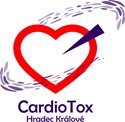 The research is tightly coordinated with the other laboratories of the network CardioTox Hradec Králové (see the section Cooperation). We focus on the cardiovascular toxicity of anticancer drugs, especially those inducing heart failure, and the possibilities of pharmacological cardioprotection. The main subject is the cardiotoxicity of anthracycline cytostatics (ANTs, e.g., doxorubicin or daunorubicin). Moreover, we have studied the toxicity of newer biologically targeted drugs, such as tyrosine kinase inhibitors (sunitinib) and proteasome inhibitors (bortezomib/carfilzomib). Our goal is to deliver high-quality experimental and translational research in cardio-oncology.
The research is tightly coordinated with the other laboratories of the network CardioTox Hradec Králové (see the section Cooperation). We focus on the cardiovascular toxicity of anticancer drugs, especially those inducing heart failure, and the possibilities of pharmacological cardioprotection. The main subject is the cardiotoxicity of anthracycline cytostatics (ANTs, e.g., doxorubicin or daunorubicin). Moreover, we have studied the toxicity of newer biologically targeted drugs, such as tyrosine kinase inhibitors (sunitinib) and proteasome inhibitors (bortezomib/carfilzomib). Our goal is to deliver high-quality experimental and translational research in cardio-oncology.
Regarding ANT cardiotoxicity, we are studying molecular mechanisms of cardiotoxicity development. We are particularly interested in the role of topoisomerase II beta (TOP2B) and its poisoning by ANTs which induces DNA damage and DNA damage response (DDR) signaling in the heart.
We have also studied the mechanisms of action of clinically used cardioprotectant dexrazoxane (DEX). Our recent work shows that its cardioprotective effects are not mediated by iron chelation, as has been believed. However, DEX acts as a catalytic inhibitor of TOP2B, thereby preventing poisoning of the enzyme by ANTs, and thus DNA damage and DDR will not happen in the heart.
We are also investigating new pharmacological cardioprotectants targeting TOP2B. We have shown that DEX derivatives, which are more potent as catalytic inhibitors of TOP2B, are also more potent in inhibiting ANT-induced DDR and, consequently, more effective as cardioprotectants. In this regard, we have identified compound GK-667, a prodrug of ICRF-193, as a promising cardioprotectant in vivo providing potent and dose-dependent cardioprotection in lower ratios to ANTs than DEX. Besides that, we study the cardioprotective effects of other TOP2B inhibitors than DEX and related agents, including newly synthesized compounds, to develop TOP2B selective, effective and safe cardioprotectants.
Our recent interest is to analyze DDR signaling induced by ANTs in the heart and tumors in vivo and its pharmacological modulation by TOP2B inhibitors and DDR inhibitors. For this purpose, we have established a model of mice bearing human tumor xenografts and their treatment with doxorubicin.
Group Leader
Postdoctoral Researchers
PharmDr. Olga Lenčová (born Popelová), Ph.D.
Mgr. Petra Kollárová (born Brázdová), Ph.D.
Daniel Diaz Garcia, Ph.D.
Former Group Members
PharmDr. Jirkovský Eduard, Ph.D. (bývalý doktorand a postdoktorand)
Mgr. Zuzana Pokorná, Ph.D. (bývalá doktorandka)
Prof. MUDr. Vladimír Geršl, Ph.D. (bývalý vedoucí skupiny)
A full list of publications can be found in the Scopus database.
Overview of last 10 years
26 papers in journals with IF in total
AIS D1 papers – 19.2 %, AIS Q1 papers – 73.1 %
Group Leader as the corresponding author – 53.2 % (with an one exception, all are Q1 papers)
Selected publications
Pokorná Z., Kollárová-Brázdová P., Lenčová-Popelová O., Jirkovský E., Kubeš J., Mazurová Y., Adamcová M., Holečková M., Palička V., Šimůnek T., Štěrba M. Primary prevention of chronic anthracycline cardiotoxicity with ACE inhibitor is temporarily effective in rabbits, but benefits wane in post-treatment follow-up. Clinical Science (London) 2022;136(1):139-161.
IF 6.876, AIS 1.456, AIS Q1
Jirkovský E., Jirkovská A., Bavlovič-Piskáčková H., Skalická V., Pokorná Z., Karabanovich G., Kollárová-Brázdová P., Kubeš J., Lenčová-Popelová O., Mazurová Y., Adamcová M., Lyon A. R., Roh J., Šimůnek T., Štěrbová-Kovaříková P., Štěrba M. Clinically Translatable Prevention of Anthracycline Cardiotoxicity by Dexrazoxane Is Mediated by Topoisomerase II Beta and Not Metal Chelation. Circulation Heart Failure 2021;14(11):e008209.
IF 10.447, AIS 4.093, AIS D1
Kollárová-Brázdová P., Lenčová-Popelová O., Karabanovich G., Kocúrová-Lengvarská J., Kubeš J., Váňová N., Mazurová Y., Adamcová M., Jirkovská A., Holečková M., Šimůnek T., Štěrbová-Kovaříková P., Roh J., Štěrba M. Prodrug of ICRF-193 provides promising protective effects against chronic anthracycline cardiotoxicity in a rabbit model in vivo. Clinical Science (London) 2021;135(15):1897-1914.
IF 6.876, AIS 1.456, AIS Q1
Pokorná Z., Jirkovský E., Hlaváčková M., Jansová H., Jirkovská A., Lenčová-Popelová O., Brázdová P., Kubeš J., Sotáková-Kašparová D., Mazurová Y., Adamcová M., Vostatková L., Holzerová K., Kolář F., Šimůnek T., Štěrba M. In vitro and in vivo investigation of cardiotoxicity associated with anticancer proteasome inhibitors and their combination with anthracycline. Clinical Science (London) 2019;133(16):1827-1844.
IF 5.223, AIS 1.327, AIS Q1
Mladěnka P., Applová L., Patočka J, Costa V.M., Remiao F., Pourová J., Mladěnka A., Karlíčková J., Jahodář L., Vopršalová M., Varner K.J., Štěrba M.; TOX-OER and CARDIOTOX Hradec Králové Researchers and Collaborators. Comprehensive review of cardiovascular toxicity of drugs and related agents. Medicinal Research Reviews 2018;38(4):1332-1403.
IF 9.791, AIS 2.096, AIS D1
Lenčová-Popelová O., Jirkovský E., Jansová H., Jirkovská-Vávrová A., Vostatková-Tichotová L., Mazurová Y., Adamcová M., Chládek J., Hroch M., Pokorná Z., Geršl V., Šimůnek T., Štěrba M. Cardioprotective effects of inorganic nitrate/nitrite in chronic anthracycline cardiotoxicity: Comparison with dexrazoxane. Journal of Molecular and Cellular Cardiology 2016;91:92-103.
IF 5.055, AIS 1.470, Q1
Štěrba M., Popelová O., Vávrová A., Jirkovský E., Kovaříková P., Geršl V., Šimůnek T. Oxidative stress, redox signaling and metal chelation in anthracycline cardiotoxicity and pharmacological cardioprotection. Antioxidants & Redox Signaling 2013;18(8):899-929.
IF 5.828, AIS 1.921, AIS D1/Q1